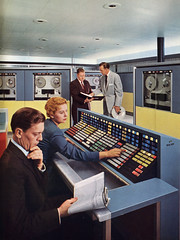Discuss: The Quantified Worker
 Friday, December 10, 2010 at 3:32PM
Friday, December 10, 2010 at 3:32PM [cross-posted from Quantified Self]
While much of our work here is focused on individual development, there are plenty of circumstances in our professional lives where we can apply the ideas of experimentation. Let me set the stage with some background and ideas, and then I'd love to hear from you on how you widen self-tracking to apply to your occupation.
First, experimentation at work is not new. Frederick Taylor's Scientific management popularized applying metrics to factory worker performance in the late 1800s. Later came W. Edwards Deming, who influenced the Japanese Lean manufacturing movement in the 50s, which integrated experimentation, measurement, and continuous improvement. A more contemporary thinker is Thomas Davenport and his ideas on How to Design Smart Business Experiments (an excerpt of a paid article).
A natural starting application for self-experimentation at work is at the individual level, such as by trying out new tools or methods, either in self-management (e.g., productivity systems like Getting Things Done) or by exploring work-specific ideas and techniques. Here at the Quantified self we've had nice discussions on time management, including:
- Colin Schiller on Time Management Experiments,
- Peter Robinett on Predicting Productivity, and
- Bill Jarrold on Productivity Tracking.
Of course self-tracking tools abound, like the oft-mentioned RescueTime (see Kevin's "Productivity" Dashboard Monitor for a bit more). Putting the Hawthorne Effect and placebo effects aside, the value in all cases is getting insight into ways you could improve how you work and then implementing them. (You can find ideas for the latter in my post Add, subtract, multiply, divide: Productivity lessons from basic math.)
Beyond the personal level, experimenting at work is baked into some domains, such as industrial design (e.g., the work of IDEO's Tom Kelley), innovation (e.g., Google's approach), marketing (e.g., SEO or Test and learn), entrepreneurship (e.g., Lean Startup), and software development (e.g., Agile methodologies). I wonder what we could learn from studying them?
Given all that, I'm curious: How have you applied experimenting and data tracking to your job? How has it worked out? What tips can you offer for making experimentation effective?





